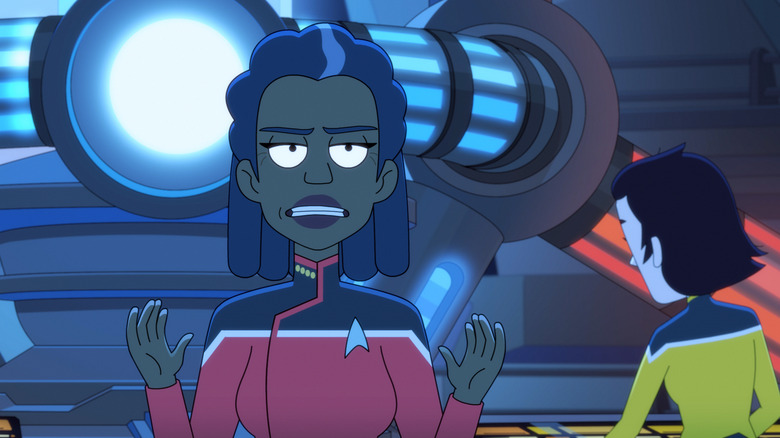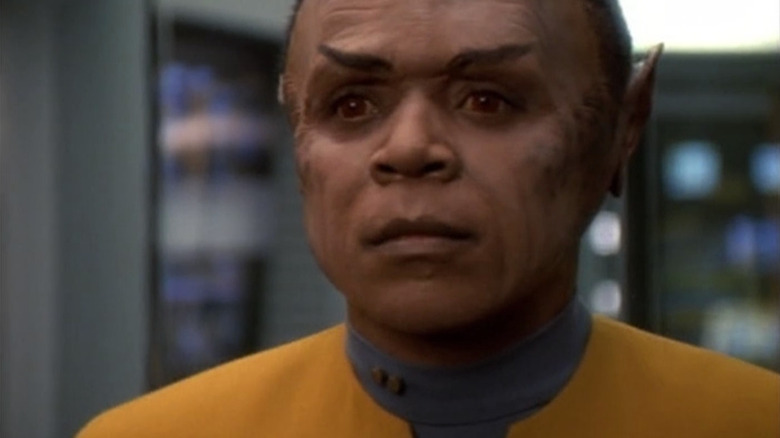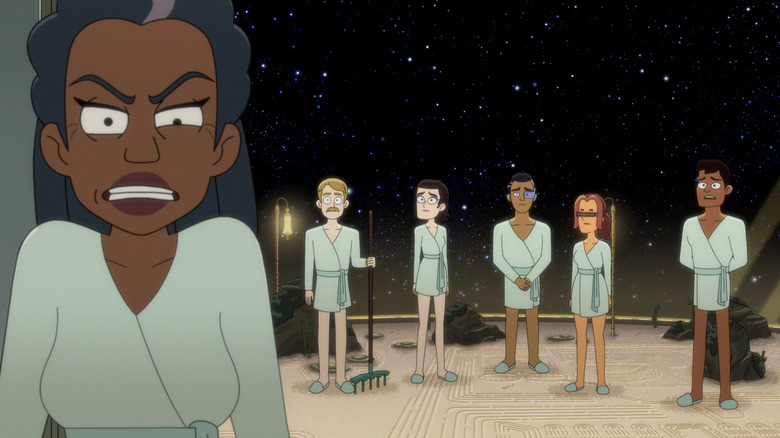How The Captain Of Star Trek: Lower Decks Would've Handled Voyager's Infamous Tuvix Situation [Exclusive]
As a California native, it will never cease to tickle me that many of the featured starships on "Star Trek: Lower Decks" are named after inauspicious and rinky-dink towns in my home state. The ships are all California class, and the central ship is called the U.S.S. Cerritos, named for a city about 45 minutes outside of Los Angeles defined by its drab landscapes and abundance of car dealerships. Also on the show has been the U.S.S. Solvang — a tiny Danish village and notorious tourist destination — and the U.S.S. Merced — a city that, uh, produces a lot of milk.
Being the captain of a California-class vessel is a thankless job, a tragedy audiences see reflected in the Cerritos' Captain Carol Freeman, played by Dawnn Lewis. Captain Freeman is often tasked with Second Contact missions, the less interesting and logistics-heavy follow-ups to First Contact missions. Her ship is not as well-equipped as many of her Starfleet counterparts, and her irascible crew is often pulling pranks that ultimately reflect poorly on her as a commanding officer (a plot point that comes to a head in this week's episode "Trusted Sources"). As such, Captain Freeman is constantly struggling to retain dignity and a reputation, often leading to outbursts of rage. She's a great character.
/Film was recently honored to interview Lewis about all things "Star Trek," the fineries of Captain Freeman, as well as one of the more important ethical issues of the modern age. Namely: What would Capt. Freeman have done about that whole Tuvix situation on the U.S.S. Voyager?
Tuvix
To fill in any non-Trekkies that may be reading, "Tuvix" (May 6, 1996) was a second season episode of "Star Trek: Voyager" wherein the characters of Tuvok (Tim Russ) and Neelix (Ethan Phillips) were merged into one being in a transporter malfunction. The resulting creature named itself Tuvix (Tom Wright), feeling he was equal parts both beings. The gag of the series was that Tuvok and Neelix were quite opposite people, with the former being a cold, logical Vulcan and the latter being a jolly, hobbit-like Talaxian. Captain Janeway (Kate Mulgrew) sets about finding a way to reverse the effects of the malfunction and separate her two crew members once again. Tuvix, however, declares that he is quite happy remaining alive as a combined being. Separating Tuvok and Neelix would effectively kill Tuvix, and he does not want to go through with the process.
Ultimately, Janeway feels that two crew members is better than one, and more or less orders Tuvix to his death. Neelix and Tuvok are resurrected and Tuvix sacrificed. Mulgrew has spoken up in defense of the Tuvix scenario (in conversation with Alexandria Ocasio-Cortez on Twitter), arguing that what Janeway did was right, as she had to advocate for the dead crew members lost in the accident.
Lewis feels that Captain Freeman is a far more intimidating figure than Janeway, and would have handled Tuvix much differently. She would have essentially frightened Tuvix into volunteering for separation. Lewis said:
"She probably would've scared him to death to separate. Yeah. Because again, she's just so over the top. I think they would've been deathly afraid to even deal with her. I think she would've found a clever way to get them into whatever machine was necessary to split them up and send them to opposite corners."
Command styles
One of the more satisfying things about following a long arc of "Star Trek" is seeing the franchise's various captains at work. "Star Trek" is, at its heart, a workplace drama that examines the efficacy and philosophy of different management styles. Captain Kirk (William Shatner) was a balanced and level-headed military captain who believed in gruff, somewhat aggressive tactics. He was typically only warm and open with his chief medical officer and his first in command. Others had to follow orders. Captain Picard (Patrick Stewart) was a more stern, mature, cerebral captain. He was the college professor you didn't want to disappoint. Captain Sisko (Avery Brooks) was the angry, intimidating captain, one who didn't mind being a little feared, but also ready to be warm when trust had been established. Captain Janeway, meanwhile, was essentially an affable authoritarian who regularly insisted on a power structure that began and ended with her.
Captain Freeman is the impatient captain. Her ship and her crew often move her to frustration. She experiments a lot, taking big command swings. In one episode, she treats her engineering staff to a spa vacation as a means of improving morale. In another, she cracks down on laziness my implementing a timer system for all menial tasks. When her crew angers her, she has no issues with discipline. Captain Freeman is not necessarily the best captain in the fleet, but she is certainly the most relatable.
When Trekkies, in their idle moments, picture themselves as Starfleet captains, they may see themselves as one of the first four listed above. In actuality, it's more likely we would all be like Captain Freeman. Annoyed, overworked, often on top of things, but sometimes beset by frustration. Captain Freeman may be the most human Starfleet captain.


